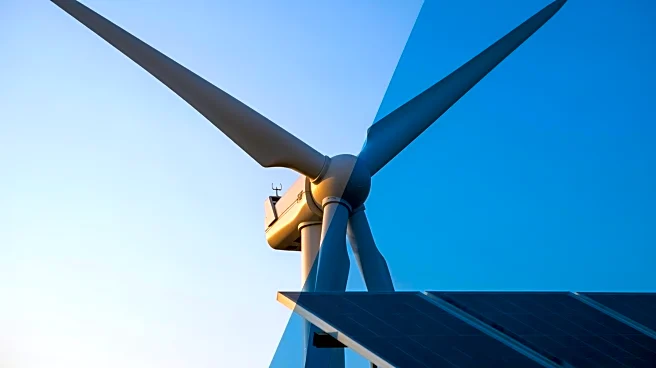What's Happening?
The International Energy Agency (IEA) has released a report indicating a significant shift in climate technologies, suggesting that now is an opportune moment to invest in these technologies. The report contrasts
current expectations with those from a decade ago, showing a potential reduction in global emissions. In 2014, projections estimated emissions would remain around 46 gigatons of CO2 per year by 2040, but current forecasts suggest emissions could drop to 33 gigatons if countries meet their commitments. This shift is attributed to advancements in renewable energy sources like solar and wind, as well as the adoption of electric vehicles and grid-management software. The report highlights the progress in countries like Germany and China, where electric vehicle sales have surged and emissions are expected to peak by 2030.
Why It's Important?
The IEA report underscores the growing importance of climate technologies in addressing global emissions and climate change. The potential reduction in emissions represents a substantial shift in global efforts to combat climate change, offering hope for achieving net-zero emissions in the future. This development is crucial for investors and policymakers, as it signals a viable path towards sustainable energy solutions. The advancements in renewable energy and electric vehicles could reshape economies, particularly in developing countries, and drive significant investment opportunities. The report suggests that despite previous pessimism, there are now clear signs of progress and optimism in the climate-tech sector.
What's Next?
The report suggests that continued investment in climate technologies could accelerate progress towards emission reductions. Countries are expected to further commit to their climate goals, potentially leading to more aggressive policies and incentives to support renewable energy and electric vehicle adoption. Investors may increasingly focus on emerging technologies like geothermal energy and advanced grid-management systems. The global community will likely monitor these developments closely, as they could influence international climate agreements and collaborations. The IEA's findings may also prompt governments to reassess their climate strategies and increase funding for sustainable energy projects.
Beyond the Headlines
The IEA report highlights the ethical and cultural dimensions of climate change, emphasizing the need for global cooperation and commitment to sustainable practices. The shift in expectations reflects a growing awareness of the environmental impact of traditional energy sources and the urgency of transitioning to cleaner alternatives. This turning point in climate technologies could lead to long-term shifts in energy consumption patterns and societal attitudes towards sustainability. The report also raises questions about the role of technology in shaping future climate policies and the potential for innovation to drive meaningful change.










